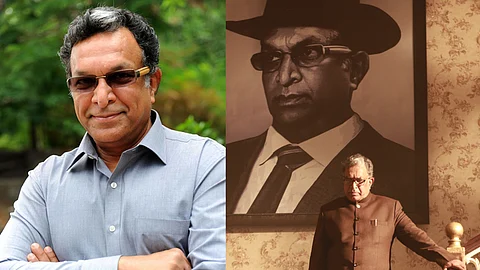

There's a calculated calmness that draws you in when a prolific legend like Nasser talks. His words flow with an ease of someone who listens more but also carries the wisdom of years. In this exclusive conversation with Cinema Express about SonyLIV’s Mayasabha: Rise of the Titans, his upcoming original Telugu series directed by Deva Katta and premiering on SonyLIV on August 7, Nasser talks with a quiet conviction in his voice.
Firstly on whether the veteran actor is a part of SS Rajamouli's SSMB29, he (laughs) and reveals, "I was involved in an initial serious discussion about preparing actors. I am not a part of the film yet. But he may call me anytime. And I have a very special relationship with Rajamouli. We know each other from his first film. I appreciate him because he never talks to anybody about anything other than cinema. And when Rajamouli narrates a scene, that is like a story by itself."
Talking about Mayasabha, Nasser says, “When this series came to me, a few other projects were also on the table. But as I read this, it felt intense, almost like a thriller. It reminded me of political dramas I’ve seen play out in real life. I thought, I know this world, and I can be comfortable here. The role I was offered was pivotal, someone who represents power, a kingmaker rather than a king. And with Deva Katta at the helm, a director who is politically well-informed and has his own ideas about this space, I had to say yes.”
In Mayasabha, Nasser plays Shivaji Rao, a self-made media baron whose clout allows him to shape political outcomes. Though the makers call it a fictional series, viewers on social media were quick to decode that this is re-imagined spotlight on the friendship between iconic political figures, Nara Chandrababu Naidu and YS Rajasekhara Reddy, who played a crucial role in shaping today’s Andhra Pradesh and Telangana’s political landscape.
Although Nasser’s Shivaji Rao appears to be based on powerful media figures like the late Ramoji Rao, Nasser says that there were multiple sources they took inspiration from. “I didn’t build Shivaji Rao from a single source,” he explains, “I first looked for clues in the script itself rather than relate it to any one real personality. After that, I drew references from multiple people I’ve read about or observed. For instance, even someone like Mr Ramnath Goenka was part of my study. A character like this cannot be traced to one person, it is an amalgamation.”
The show explores power in shades rather than absolutes. “I don’t know how the director will ultimately place my character,” Nasser admits and adds, “I performed what he asked of me. But it is not black or white. Our political system itself is unique, hundreds of parties, countless voices. That chaos and plurality are what define us, and Mayasabha reflects that.”
For Nasser, Telugu cinema has been more than just another industry he works in. He recalls, “Wherever I go in Telugu-speaking regions, people treat me like family. Films like Matrudevobhava, Athadu, and Chanti gave me characters that audiences still hold close to their hearts. I am deeply grateful to the writers and directors who placed me in such roles. When you are given respect and responsibility, it also creates a kind of fear, you feel you must live up to it.”
He recalls the uniquely quiet bond he shared with Mahesh Babu on Athadu, which is set for a re-release on August 9. He notes, “In Athadu, unlike Pokiri or Businessman, our scenes were subdued, almost wordless. Our communication was internal. Rarely do you get to perform in South Indian cinema where your connection with another character is conveyed without lengthy dialogues. It was brilliantly written by Trivikram, and as an actor, that challenge fascinated me. That’s why it resonates even today.”
And regarding his camaraderie with Mahesh Babu, he pauses and smiles and says, “What I love about him is, Mahesh has this broad smile when he enters a studio. He strips away the stardom when he talks to co-actors. That warmth creates comfort. I think that ease between us translates onscreen, which is why audiences connect to it.”
When asked about his favourite contemporary Telugu actors, he (laughs) resists naming favourites, and shares, “I look for performances rather than performers. This younger generation is fierce in a positive way. Their aggression comes from wanting to give their best because the competition is intense. I admire that zeal.”
Nasser’s plate is characteristically full. “I’m working on Suriya’s Telugu film (Suriya 46), Prashant Neel and Jr NTR’s film, and Mahakali with director Pooja,” he lists and adds, “I also have Hindi films and my regular Tamil commitments. I try to pick roles that feel different from what I’ve done before. Even if it’s similar, I look for ways to create something new.”
As for Mayasabha, its premise of two friends-turned-political rivals locked in a battle that reshapes a state feels both intimate and epic. “India’s identity is its diversity,” Nasser says thoughtfully and adds, “We can never be one thing. We have many languages, many foods, and many arts. That diversity is our strength, and it’s also why stories like Mayasabha feel so real. They show how politics, power, and people intertwine in ways that are uniquely ours.”
With Aadhi Pinisetty, Chaitanya Rao, and Divya Dutta headlining alongside him, and Deva Katta’s penchant for political drama, the series already carries a certain intrigue. But it is Nasser’s ability to ground such worlds in a lived-in reality that makes it feel like more than fiction. As for his choices in cinema, he puts it with characteristic simplicity: “Whether it is cinema or now a series, I only ask myself one thing: does this story let me do something I haven’t done before? If it does, I say yes.”
Mayasabha is gearing up to grace the small screens on SonyLIV from August 7.